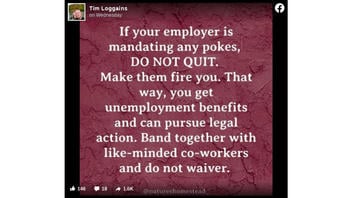
If your employer requires you to be vaccinated against COVID-19, should you make them fire you in order to receive unemployment benefits? No, that's not true: in many states, unemployment benefits applicants who are fired are not eligible for benefits, according to a representative of the National Employment Law Project (NELP) and several state laws.
The claim appeared in a Facebook post (archived here) published on August 5, 2021. It featured a graphic that read:
If your employer is mandating any pokes, DO NOT QUIT. Make them fire you. That way, you get unemployment benefits and can pursue legal action. Band together with like-minded co-workers and do not waiver.
This is what the post looked like on Facebook on August 9, 2021:
(Source: Facebook screenshot taken on Mon Aug 9 20:36:52 2021 UTC)
According to a fact sheet from the U.S. Department of Labor, there are two standard requirements for state unemployment benefits, which are funded in part through federal government taxes:
- You must meet the State requirements for wages earned or time worked during an established period of time referred to as a "base period". (In most States, this is usually the first four out of the last five completed calendar quarters prior to the time that your claim is filed.)
- You must be determined to be unemployed through no fault of your own (determined under State law), and meet other eligibility requirements of State law.
Many states have unemployment insurance (UI) laws that deny benefits to applicants who were fired due to misconduct. For reference, Nolo, a leading online legal guide, defines "misconduct" in the workplace as "willfully doing something that substantially injures the company's interests."
Additionally, the U.S. Equal Employment Opportunity Commission has stated that employers can require that employees physically entering their workspace be vaccinated against COVID-19, as long as those requirements are not also made on the basis of discriminatory factors.
In an email to Lead Stories on August 9, 2021, Oliver Jones, a public affairs representative for NELP, provided us with a quote from Nicole Marquez, director of social insurance at NELP, regarding the claim:
It's a grey area and as always with these types of questions will be a fact intensive inquiry. It will also depend on the state. Generally, the claimant would not qualify for UI if they refuse to comply with an employer vaccine requirement. However, if the underlying reason for refusal is for religious or disability related reasons and the employer failed to offer a reasonable accommodation under Title 7 or ADA, then the worker may be entitled to collect UI.
While every state law varies, it seems unlikely that the claim as presented on Facebook will work in many states in the U.S. Employees can take legal action, although their chances at success are uncertain. This is evidenced in our sample of various state laws. We researched the unemployment benefits laws regarding quitting or being fired in 10 states in different regions throughout the United States:
The Alabama Department of Labor says,
If you voluntarily quit your job, the burden of proof is on you to show that you quit for a good work-connected reason. If you are terminated or discharged, your employer must show that you were terminated for a work- connected cause as stated in the Alabama UC Law.
In Alaska, there is a possibility that you may still receive UI if you quit or were terminated due to misconduct from your previous position. However, you may be subject to a six-week disqualification period, which would make you ineligible for the Extended Benefit program and would shave three weeks off of the total amount of benefits you would receive.
In Arkansas, the state where the Facebook user who posted the claim is from, the Arkansas Division of Workforce Services' unemployment insurance handbook states that unemployment benefits can only be paid to you if "you are not under a disqualification." Two of the most common disqualifications are quitting without good cause in connection with the work or being fired due to misconduct.
Regarding unemployment benefits after quitting a job or being fired, the California Employment Development Department says,
We will schedule a phone interview to discuss your claim and circumstances. If you quit, you must prove good cause for quitting. If you are fired, your employer must prove there was misconduct. Either party can disagree with the decision and file an appeal.
The Florida Department of Economic Opportunity states that you may be ineligible for reemployment assistance if you were discharged for work-related misconduct or for a dishonest act, or if you quit without good cause.
In Maine, Missouri and New Mexico, you may be ineligible for unemployment benefits if you were fired or discharged due to misconduct, or if you left voluntarily without good cause.
The New York Department of Labor gets more specific, and states that you may denied unemployment benefits if you "Were fired because you violated a company policy, rule or procedure, such as absenteeism or insubordination" or if you "Quit your job without good cause, such as a compelling personal reason."
The Oregon Employment Department compiled an extensive list of reasons you may be denied unemployment benefits, including quitting your job or being fired or suspended from your job.
U.S. Department of Labor statistics indicate workers have a low success rate with appeals. They won a reversal in just over 26% of appeals nationwide in June of 2021.















